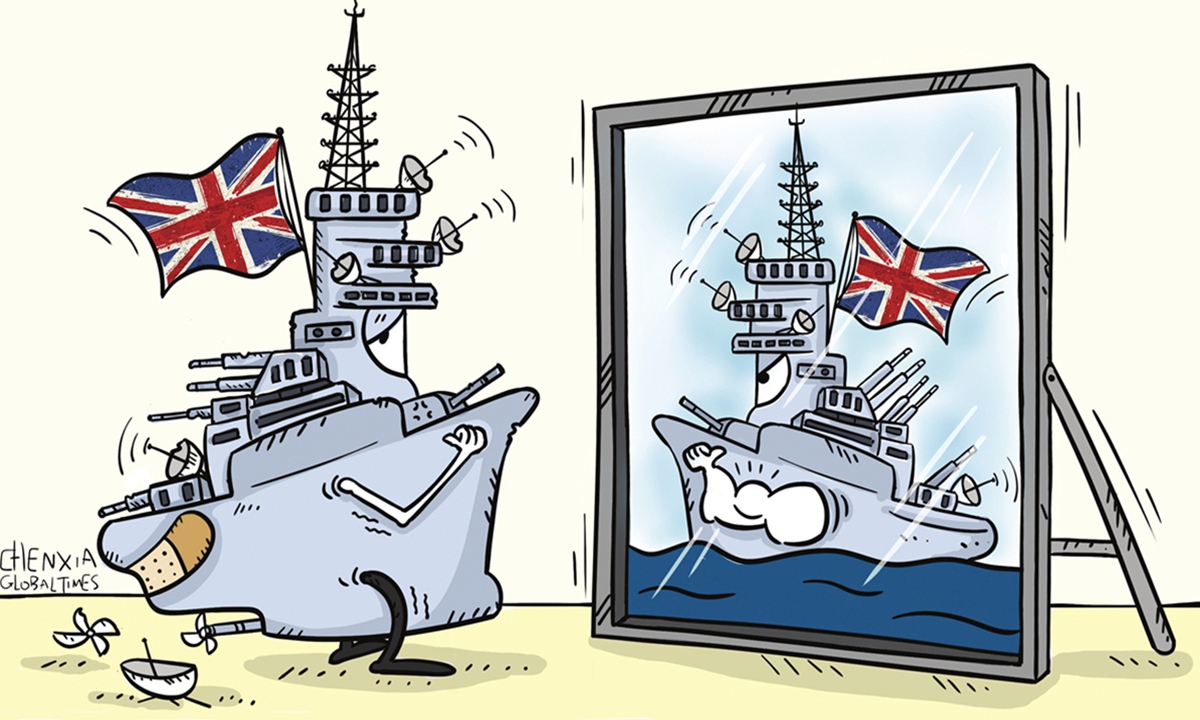UK's presence to be met with vigilance
in Indo-Pacific if it seeks to create chaos

Illustration: Chen Xia/GT
Despite its diminishing influence in the world, the UK is still attempting to cast the few glimmers the British Empire has left on the Indo-Pacific region. The UK has been increasingly trying to boost its presence in the region to emphasize its role in regional affairs and prove that it is still relevant.Britain's new Foreign Secretary James Cleverly kicked off his first Asia trip to Japan, South Korea and Singapore on Monday. According to media reports, this is his second overseas trip since taking office on September 6, highlighting the importance Britain attaches to the Indo-Pacific region.
Not coincidentally, British Prime Minister Liz Truss told CNN on Sunday that the UK will continue to work with its allies to ensure that "Taiwan is able to defend itself." It is clear that the Truss administration will enhance the strategy of the Indo-Pacific tilt proposed by the Boris Johnson administration in March last year.
Ironically, the last time the country was so active in the region could arguably be traced back to the British Empire when it colonized many countries there. The UK is strategically tilting toward the Asia-Pacific region, but ambition alone cannot bolster its Indo-Pacific Strategy. Britain's national strength is constantly declining, and the country's political, economic and military capabilities haven't been as strong as before. Therefore, its actual capabilities do not match its diplomatic ideals and ambitions, and it's hard for Britain to rely on its own strength to achieve its strategic intentions.
Britain's presence in the region aligns with the US Indo-Pacific Strategy to contain China. In particular, London has focused on highlighting its role in regional security. In many degrees, the UK has no other choice but to tilt toward the Indo-Pacific. On one hand, as the ex-empire's strengths keep declining, Britain can only prove its relevance in Indo-Pacific by hitching the ride of US hegemony. On the other hand, the UK has lost its trust and markets in Europe since exiting the EU, and London is seeking opportunities in the booming Indo-Pacific economies, the engine of global economic growth.
However, regional countries maintain great vigilance toward the UK's presence. Apart from its past colonial actions, the country's close cooperation with US' provocative strategy in Indo-Pacific could undermine regional peace and stability and weaken the momentum of economic cooperation in the region.
Last Wednesday, Truss announced that she had ordered an update to Johnson's integrated review of security, defense, and foreign policy, in which her version of the Indo-Pacific tilt is expected to be seen. Xu Liping, director of the Center for Southeast Asian Studies at the Chinese Academy of Social Sciences, predicted that the UK under the Truss administration will tilt further toward Indo-Pacific.
Regardless, what Truss must understand is that while the UK is welcome to seek opportunities for economic development in the Indo-Pacific region, if the country intends to play politics and create chaos, it will only face significant failure soon.
Chinese military expert and TV commentator Song Zhongping, believes that Britain is still thinking as a colonizer, so when it comes back to the Indo-Pacific region, it can easily bring its colonial thinking and practices there.
"If the UK can put aside its arrogance and prejudice, it is likely to see more chances for cooperation. But if the strengthening of its presence in the region targets interfering in the internal affairs of other countries and stirring up trouble, London will only find it challenging to be accepted by regional countries," noted Song.

